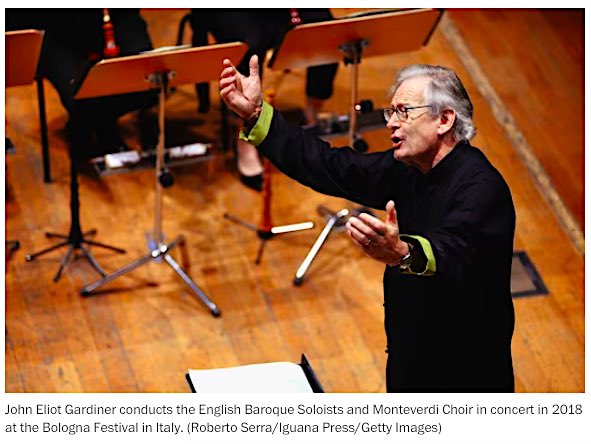
Few “Great Artists” are angels. Occupational musicians around the world are prone to “deviating from behavioural norms”—not just those of lowly social status, or rank-and-file orchestral musos letting off steam on tour, but composers, maestros and prima donnas throwing their toys out of the pram.
After last month’s incident involving the “venerated” John Eliot Gardiner was exposed on Slippedisc, it soon went viral (e.g. here), making clickbait even for the tabloids. We riff-raff seem to derive particular pleasure from deflating authority figures; orchestral musicians, only too aware that maestros can be difficult, find a paltry safety valve in maestro-baiting.
Setting forth from Norman Lebrecht’s stimulating The maestro myth, Michael Landor Brodeur has written a perceptive article in the Washington Post. With the age of the dictator largely over (he cites Solti, Reiner, Szell, Ormandy, Böhm, Toscanini—“bullies with batons”—do watch the “scary and fascinating” video clips of rehearsals here), recent decades have seen a general improvement in behaviour. As Richard Morrison wrote in The Times, “young conductors today tend to be well-schooled, well-mannered technocrats, good at their jobs but rarely making outrageous demands.”

While Gardiner is highly demanding, generally he is the soul of charm, most cordial with singers and players. Still, for musicians who have worked with him (and I played for the English Baroque Soloists and the Orchestre Révolutionnaire et Romantique for nearly two decades—see e.g. The Mary Celeste) the incident came as no surprise (see e.g. here). Brodeur cites this 2013 talk by Gardiner:
The article goes on:
Listen to him talk about that composer’s own “combative” personality and “deeply flawed” character. Listen to him rail against the “deplorable tendency” among biographers to omit this side of Bach, and in doing so, “imply that great music requires a great man and a great human being and a great personality to be behind it.”
“Of course great music requires a creator, but he doesn’t have to be a paragon of virtue,” Gardiner says to the viewer. “And Bach certainly wasn’t.”
It’s hard not to hear him pleading his own case.
After the Incident the language of Gardiner’s press releases may seem formulaic—withdrawing from engagements to focus on his mental health while engaging in a course of counselling, “taking a step back in order to get the specialist help I recognise that I have needed for some time. I want to apologise to colleagues who have felt badly treated and anyone who may feel let down by my decision to take time out to address my issues. […] I am heartbroken to have caused so much distress and I am determined to learn from my mistakes”. Still, he appears genuinely contrite—by contrast with Tory ministers today, who would never dream of apologising for anything.
Musicians agree that Gardiner’s concerts are astounding, albeit unduly stressful. I can’t help contrasting S-Simon Rattle—who, when a passage doesn’t sound quite right in rehearsal, will work out how to communicate better, rather than blaming the musicians for deliberately sabotaging his artistic vision.
For Gardiner’s journey in performing early music, click here; for his brilliant book Music in the castle of heaven, here and here; his recordings feature in many posts listed under A Bach retrospective. See also The art of conducting: a roundup. For Freud and Mahler, see Men behaving badly.

